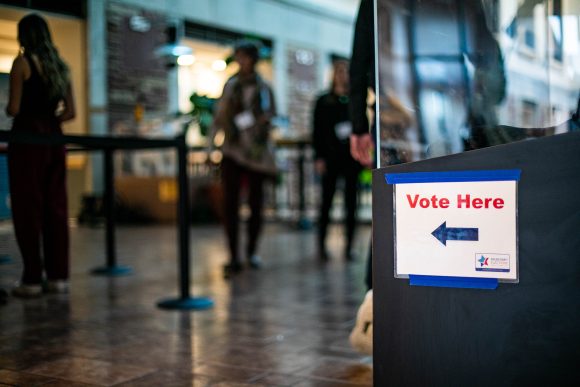
“Vote Here” signs line the University Memorial Center’s walls on Nov. 8, 2022 for the midterm elections. (Io Hartman/CU Independent)
After a night of big wins for Colorado Democrats and mixed results for a fair share of ballot initiatives down the ballot, Boulder County’s election results still aren’t finalized. However, the unofficial results paint a somewhat-clear picture of how residents voted on the state’s biggest issues.
Just under 170,000 people voted in Boulder County’s election, as of 7 a.m. on Nov. 9. That puts Boulder’s turnout on Wednesday morning at about 74.5%, just over seven points lower than the 82.3% turnout of 2018’s midterm election.
Boulder voters were overwhelmingly in favor of Democrats at the state and national levels, to no one’s surprise. At a local level, voters look ready to reject the repeal of the CU South annexation and switch city council elections to general election years.
While officials have yet to finalize Colorado’s election results, and some races are still too close to call, there’s a lot to learn about Tuesday’s outcomes.
Here are the biggest takeaways from election night:
Colorado Democrats took home wins across the state
Less than an hour after polls closed in Colorado, NBC declared Gov. Jared Polis and Sen. Michael Bennet had won their reelection bids. These announcements, which came before many of the partisan watch parties could get underway, were the first signs of a wave of support for blue candidates.
Polis beat former CU Regent Heidi Ganahl by 20 points, while Bennet won with a 13-point lead over contender Joe O’Dea. Polling by FiveThirtyEight suggested these races would be far closer earlier in the year.
Attorney General Phil Weiser and Secretary of State Jena Griswold were also reelected, although those results came later in the night, continuing a positive trend for Colorado state executives.
At the legislative level, Democrats look on track to retain the State House of Representatives and Senate. They could even take more seats than they won in 2020, in an already strong trifecta of liberal power in the state capital.
Congressman Joe Neguse won another term as Colorado’s 2nd Congressional District representative, defeating his challenger Marshall Dawson by a 40-point margin.
The big upset of this election is actually still a toss-up. Lauren Boebert, representative for Colorado’s 3rd Congressional District, is currently trailing behind her opponent by a mere 73 votes as of 6:43 p.m. Wednesday night. Democrat Adam Frisch could unseat the controversial Republican in a race where he is leading by a slim margin.
State voters decriminalized psychedelic mushrooms, endorsed affordable housing and rejected alcohol delivery
Voters across the state were met with a slew of ballot issues and propositions to vote on this year. Those issues ranged from funding school lunches for children by taxing wealthy Coloradans (which passed) to legalizing the delivery of alcohol using third-party companies, which didn’t.
By a margin of about 30,000 votes, Colorado voters are on track to pass the decriminalization of Proposition 122, which would make psychedelic mushrooms legal in Colorado. The proposition allows licensed centers to administer these mushrooms under supervision through the Regulated Natural Medicine Access Program, also created by the proposition.
Voters are also likely to pass Proposition 123. This measure would dedicate 0.001% of state income tax revenue to fund local housing initiatives. If passed, the funds would be up to the local government’s discretion to use on housing initiatives in their communities.
Voters rejected a trio of propositions relating to the availability of liquor licenses and alcohol sales. The measures had been heavily funded by large companies like DoorDash, while local liquor stores said they would be negatively impacted by the proposals.
Boulder will proceed with CU South Annexation and switch city council election years, but the library district is still in the air
At the local level, Boulder’s most controversial ballot measure failed. A measure to repeal the annexation of CU South is likely to lose by about 2,000 votes.
CU South is a 300-acre property in South Boulder that the university has owned since 1996. The university wants to develop this property, which Boulder residents currently use as open space, to build new university infrastructure.
As a part of the city and the university’s annexation plan, about 100 acres will be used to build university buildings, 100 acres will continue to be used as open space and the rest will be devoted to flood protection.
Meanwhile, ballot measure 2E, which would switch city council elections from off-years to general election years, is likely to pass with a wide margin of about 5,000 votes.
The closest county race, the creation of a new library district, is still too close to call.
The measure would create a new special district, like a school district or fire protection district, that would take charge of the City of Boulder’s libraries. The measure would also increase property taxes for the City of Boulder and some unincorporated Boulder County residents.
Opponents of the initiative lead by about 49 votes, but the margin is too slim to call.
Boulder County will continue to update their counted tallies online around 4:30 p.m. for the next several days as officials count the remaining ballots.
Contact CU Independent Editor-in-Chief Henry Larson at Henry.Larson@colorado.edu.
